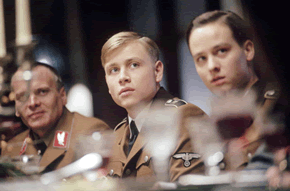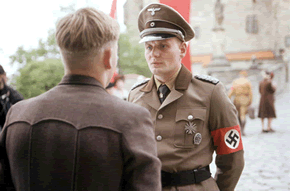|

Awards:
Winner
- AUDIENCE AWARD
Hamptons International Film Festival
Winner -- BEST ACTOR
Karlovy Vary Internation Film Festival
Winner -- BEST DIRECTOR
Bavaria Film Festival
Winner
-- BEST FILM
Viareggio Europacinema Film Festival
In
German with English Subtitles and Chinese Subtitles
Genre: Drama
Director: Dennis Gansel
Starring: Max Riemelt, Tom Schilling, Devid
Striesow, Joachim Bissmeier, Justus von Dohnanyi
RunTime: 1 hr 48 mins
Released By: Lighthouse Pictures & Cathay-Keris
Films
Rating: NC-16 (War violence)
Website:
http://www.lhp.com.sg/napola
Opening
Day: 11 August 2005 (Exclusively at Cathay Cineplex
Orchard)
Interact
with our members on "Napola" here!
Synopsis
:
This
film is about the a type of Nazi school called the NPEA, which
means NAtional POLitische erziehungs Anstalt (National Political
Education Institute) designed to train the future Gauleiters
(heads of Nazi Districts) of the world. Napola was the popular
name for the schools; just as Nazi was for NAtional soZIalist.
Movie
Review:
“In
my fortresses, we shall raise a young generation that will
make the world tremble with fear…” – Adolf
Hitler
With
this vision, Adolf Hitler created an ideology so potent and
influential that the National-Political Institutes of Learning
(Napolas) are remembered till this day. Napolas are military
institutions that train cadets into Gauleiters, Head of the
Nazi (NSDAP) district. The cadets are considered the superior
breed and the elites of the Germans, destined to be future
generals. And it is on this premise that the film Napola is
based on.
Friedrich
Weimer (Max Riemelt) is a young, diligent lad working in Berlin
in 1942. Coming from a working class family, he longs for
a better life for himself and his family. His luck turned
for the better when one day, his passion for boxing brought
him nearer to his goal. In a boxing bout, his astounding agility
and fighting prowess caught the eye of a recruiting officer
Heinrich Vogler (Devid Striesow) from Napola. Impressed by
his abilities, Heinrich invited Friedrich to join the prestigious
Napola in Allenstein (a city in North-East Poland) and the
latter willingly obliged.
Friedrich
met Albrecht Stein (Tom Schilling) in a chance encounter during
his training and discovered that he is the son of a high-ranking
German officer. Contrary to Friedrich’s ruggedness and
grit, Albrecht comes across as weak and soft. It’s this
characteristics of Albrecht that prompts Friedrich to be protective
towards him. And it’s the deep friendship forged between
them that ultimately makes Friedrich question his belief and
change his life forever.
Director
Dennis Gansel has crafted a masterpiece out of this film.
He illustrates vividly how young innocent adolescents are
indoctrinated by Nazism, a form of fascist ideology (the dominant
and oppressive, violent control by a dictator through terror
and censorship, which involves racism at times). He enables
the audience to experience the dilemma faced by the young
cadets, which is to choose between being subservient to the
Third Reich or risked losing all through expulsion. And most
importantly, it allows the audience to catch a glimpse of
the practices of the Nazis, their wanton killings of Russian
POWs and the crazed desire to excel, even among their own
breed. It’s definitely Darwinism Theory stretched beyond
the limit.
The
contrast in character between the two male leads and their
different views on Nazism are also interesting highlights
of the film. Being able-bodied, Friedrich senses the fragility
in Albrecht and tries to make him stronger through encouragement.
Albrecht, on the other hand, tried to talk Friedrich out of
serving the school and abiding by their ideology. It’s
this conflict of interest between them and the ultimate decisions
that they made that truly makes this film one of the finest
in German cinema, and possibly in the international film arena
as well. As at time of typing, this film has already garnered
several wins and being screened in various film festivals.
There have been several war films being made over the past
years, such as Roman Polanski’s The Pianist (2002),
seeing the brutality of war through the eyes of a Jew. Then
there’s the TV series Hitler: The Rise of Evil (2003),
a biography that traces the life of Adolf Hitler. And there’s
Downfall (2004), a recent film that narrates the last hours
of the German dictator. However, nothing comes as close to
this film as Steven Spielberg’s Schindler’s List
(1993), both of which portrays a Good Samaritan in a German.
While Oskar Schindler may be seen as a German rescuing the
helpless Jews, a more poignant portrayal is seen in this film
in the form of the two male protagonists vacillating between
accepting and rejecting the ideology of Nazism. It exemplifies
the fact that there exists individuals who renounce Nazism
and defy its ideology that is imposed on them.
This
is a film that doesn’t follow conventional practice
of basing the story directly on the Holocaust and the Third
Reich but rather, provides an alternative voice. In the past,
war films have placed their focus on the cruelty and brutality
in the battlefield with little or no character focus. This
film goes beyond traditional filmmaking in this genre by placing
a humane face to the film, with characterisation of the protagonists
superceding events.
While
some viewers may feel that the film is bias (considering that
it is fictitious and produced by a German director), it is
enlightening to know that the story adheres closely to actual
events. That the Germans actually acknowledge the few unsung
heroes who dared to resist the ideologies of Hitler and willing
to pay the price for defiance are commendable.
And
this is their untold story.
Movie
Rating:
   
(An
introspective look at exploited youths by the Third Reich.
A brilliant film!)
Review
by Patrick Tay
|






